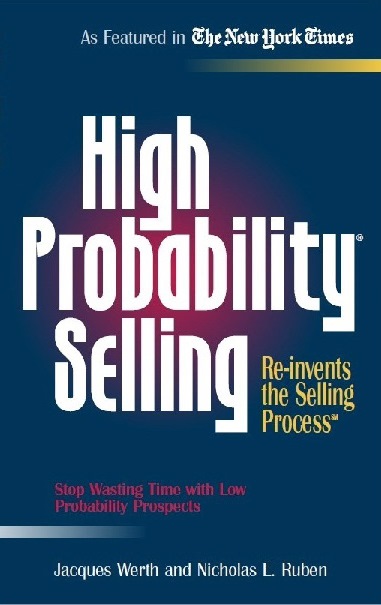
So You’ve Read the Book – Now What?
If you have any questions about High Probability Selling, we are having a live and interactive video meeting on Zoom

These fundamentals and principles of High Probability Selling have always been there, but in many cases, were never specifically taught to our students, including you and me.
Life as we know it, since HPS was first formulated and shared, has changed. The information age and resulting information overload, which helped dramatically change the role of people in sales, has increased exponentially. Time seems even shorter than ever. For many, the phone has been replaced by texting, or email, or LinkedIn, or AI.
One thing has not changed. Sales is still significantly a human to human endeavor. And it still runs on commitment and mutual respect and trust. How a salesperson is being matters even more now, as human to human connection is waning in the face of automation. Because of these changes, HPS is actually more useful than in the past, as saving time and stress while offering a real human connection with our customers and clients has never been more important. However, it’s not the HPS process that is at the heart of the power of HPS.
Over most of the last 25 years, HPS has been taught and broadcast as a rigid linear PROCESS, a series of scripted steps leading to a sale. For this reason, HPS has for many only been seen as just another sales technique. The primary instructor during that time was Jacques Werth, author of the book HPS, and certainly one of the founders and masters of High Probability Selling. As we say in HPS, everything has benefits and detriments.
A key benefit is that many of you learned from “the source”, or the master of the craft and in this case the designer of the system. A key detriment is that learning from “the source” is prone to the master skipping over the fundamentals and principles, not intentionally, but more in the category of “it goes without saying”. When anyone becomes super proficient at a craft, they tend to forget how they got there and the principles become invisible to them.
Jacques understood that there was MORE to HPS than only the process. However, he found that as a teacher, he could reliably and consciously teach only the linear process, as he had a blind-spot articulating the principles and fundamental understandings that formed the bedrock of HPS practices. So, unless you could read everything between the lines, you probably missed a lot of what makes HPS effective.
The problem is that rigid linear processes don’t adapt well to changes. Another problem is, that without understanding and awareness of the fundamental principles of that process, making the inevitable changes to the process are at best ineffective and at worst self-destructive.
Many of us, myself included, have learned this the hard way. I had to essentially throw the process out the window and rebuild one that would work in multiple work situations. I have been blessed to have learned the fundamentals and guiding principles in the early 90’s when ALL of HPS, not only the process, was taught. I also had the opportunity to teach ALL of HPS to a couple hundred students before the sole focus on the process was implemented in the training by Jacques.
We have decided, following a deep inquiry and soul searching analysis of my 30 plus years of learning, using, and adapting HPS to a half dozen plus business and leadership environments, that we must share and teach the FULL METHODOLOGY of HPS, including but not limited to the process alone. This way our students can learn how to adapt and change their HPS process to fit their changing marketplace, without losing the power and the key elements of HPS in their business and their lives.
The next HPS Community Forum meeting will be a conversational introduction to this new direction in HPS coaching and training. Please bring your questions, concerns, and comments. See you Thursday 1 August 2024 on Zoom at 9:30 AM (USA Eastern Time). Register here.

If you have any questions about High Probability Selling, we are having a live and interactive video meeting on Zoom
Ultimately, staying in the game is the deepest Why behind our decisions. When examining how we make our decisions, we
Take the first step toward mastering a proven sales system that works. Whether you’re just starting with the High Probability Selling book or looking for advanced training and coaching, we have the tools to help you succeed. Explore our resources and begin transforming the way you sell—consistently and confidently.